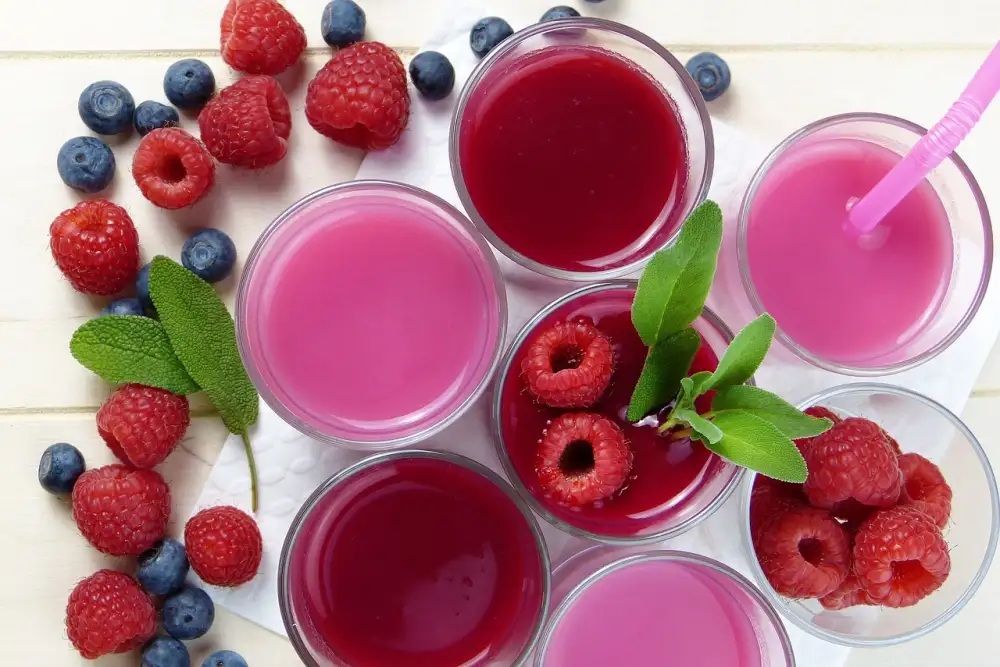Revitalize Your Health with the Ultimate Juice Diet: A Nutrient-Rich Path to Wellness

In our fast-paced world, it's easy to neglect our health and well-being. But what if there was a simple way to revitalize your health and boost your energy levels? Enter the juice diet, a nutrient-rich path to wellness that has gained popularity in recent years.
The concept behind the juice diet is simple: replace solid meals with freshly squeezed juices made from fruits and vegetables. By doing so, you provide your body with an abundance of vitamins, minerals, and antioxidants in a convenient and easily digestible form.
Juice diets have been praised for their ability to detoxify the body, improve digestion, promote weight loss, and enhance overall vitality. The high concentration of nutrients in juices can help strengthen the immune system, support healthy skin, and even reduce the risk of chronic diseases.
Unlike traditional diets that restrict food choices or require complicated meal planning, the juice diet offers a refreshing simplicity. With an array of delicious juice combinations available, you can enjoy a variety of flavors while nourishing your body.
Whether you're looking to kickstart a healthier lifestyle or simply give your body a much-needed reset, the juice diet can be an excellent option. In the following sections, we will explore different types of juices to include in your diet, how to start a juice diet effectively, tips for success, potential risks and precautions to consider, as well as answers to frequently asked questions about this rejuvenating approach.
So grab your juicer and get ready to embark on a journey towards improved health and vitality with the ultimate juice diet!
Benefits of Juice Diet for Health
The juice diet offers numerous health benefits that can revitalize your overall well-being. Firstly, it is an excellent way to increase your daily intake of fruits and vegetables, providing a concentrated dose of essential vitamins, minerals, and antioxidants. These nutrients help strengthen the immune system, promote healthy digestion, and support optimal organ function.
Additionally, the juice diet can aid in weight loss and detoxification. Freshly squeezed juices are low in calories but high in fiber, which helps control cravings and keeps you feeling full for longer. The high water content in juices also helps flush out toxins from the body, promoting a natural detoxification process.
Moreover, consuming a variety of fruit and vegetable juices can improve skin health by hydrating the skin from within and providing essential nutrients for a radiant complexion. The antioxidants present in these juices also help combat free radicals that contribute to premature aging.
Furthermore, the juice diet can boost energy levels due to its rich nutrient content. The easily digestible nature of juices allows for quick absorption of nutrients into the bloodstream, providing a natural energy boost without relying on caffeine or sugar.
Overall, incorporating a juice diet into your lifestyle can lead to improved health outcomes such as enhanced immunity, weight management, detoxification, glowing skin, and increased energy levels.
Types of Juices to Include in a Juice Diet
When embarking on a juice diet, it's important to include a variety of juices to ensure you're getting a wide range of nutrients. Here are some types of juices that you can incorporate into your juice diet:
1. Green Juices: These are made primarily from leafy greens like spinach, kale, and Swiss chard. They are rich in vitamins, minerals, and antioxidants that help detoxify the body.
2. Citrus Juices: Oranges, grapefruits, lemons, and limes are packed with vitamin C and other immune-boosting nutrients. They also add a refreshing flavor to your juice blend.
3. Beetroot Juice: Beetroot is known for its detoxifying properties and ability to support liver function. It's also high in iron and folate, making it an excellent choice for those with low energy levels.
4. Carrot Juice: Carrots are loaded with beta-carotene, which is converted into vitamin A in the body. This nutrient is essential for healthy skin, vision, and immune function.
5. Berry Juices: Berries like strawberries, blueberries, and raspberries are bursting with antioxidants that protect against cell damage caused by free radicals. They also add a delicious sweetness to your juice.
6. Watermelon Juice: This hydrating fruit is not only refreshing but also rich in lycopene—a powerful antioxidant that promotes heart health.
Remember to experiment with different combinations of fruits and vegetables to find flavors that you enjoy. Including a variety of juices will ensure you receive a diverse range of nutrients necessary for optimal health during your juice diet journey.
How to Start a Juice Diet
Starting a juice diet can be an exciting and transformative journey towards better health. Here are some steps to help you get started:
1. Set your goals: Determine why you want to start a juice diet. Whether it's for weight loss, detoxification, or simply improving your overall well-being, having clear goals will keep you motivated.
2. Choose the right juicer: Invest in a good quality juicer that suits your needs. Look for one that is easy to use, clean, and has different speed settings for various fruits and vegetables.
3. Plan your juices: Research different juice recipes and plan your meals in advance. Include a variety of fruits, vegetables, and herbs to ensure you receive a wide range of nutrients.
4. Stock up on produce: Purchase fresh, organic fruits and vegetables from local markets or grocery stores. Aim for a colorful assortment to maximize the nutritional benefits.
5. Start slow: Ease into the juice diet by replacing one meal with a juice initially. Gradually increase the number of meals replaced until you're consuming only juices.
6. Stay hydrated: Alongside your juices, drink plenty of water throughout the day to stay hydrated and aid in detoxification.
7. Listen to your body: Pay attention to how your body responds to the juice diet. If you experience any discomfort or unusual symptoms, consult with a healthcare professional.
Remember, everyone's body is unique, so it's essential to listen to yours and adjust the juice diet accordingly. With dedication and proper planning, starting a juice diet can be an invigorating step towards revitalizing your health.
Tips for a Successful Juice Diet
1. Choose organic fruits and vegetables: Opt for organic produce to ensure that your juices are free from harmful pesticides and chemicals.
2. Mix up your ingredients: Experiment with different combinations of fruits, vegetables, and herbs to keep your taste buds excited and to maximize the nutritional value of your juices.
3. Drink plenty of water: While juice can be hydrating, it's important to also drink enough water throughout the day to stay properly hydrated.
4. Listen to your body: Pay attention to how you feel during the juice diet. If you experience any discomfort or unusual symptoms, consult a healthcare professional.
5. Incorporate exercise: Engage in light exercises like yoga or walking during your juice diet to support overall wellness and maintain muscle tone.
6. Stay consistent: Stick to a regular juicing schedule and avoid skipping meals. Consistency is key in reaping the benefits of a juice diet.
7. Be mindful of sugar content: While natural sugars found in fruits are healthier than processed sugars, be mindful of consuming excessive amounts as it can affect blood sugar levels.
8. Gradually transition back to solid foods: After completing your juice diet, slowly reintroduce solid foods into your diet by starting with easily digestible options like soups or steamed vegetables.
Remember, consulting with a healthcare professional before starting any new diet is always recommended for personalized advice and guidance on achieving optimal health during a juice cleanse.
Potential Risks and Precautions of Juice Diet
While a juice diet can offer numerous health benefits, it is important to be aware of potential risks and take necessary precautions. Firstly, a juice diet may not provide all the essential nutrients your body needs, such as protein and healthy fats. It is crucial to ensure you are still getting these nutrients from other sources.
Additionally, consuming only juices for an extended period can lead to a calorie deficit, which may result in fatigue, dizziness, and muscle loss. It is vital to listen to your body and consult with a healthcare professional before embarking on a long-term juice diet.
Moreover, some individuals may experience digestive issues such as bloating or diarrhea due to the high fiber content in certain juices. Gradually introducing juices into your diet and choosing low-fiber options can help mitigate these issues.
Lastly, those with certain medical conditions like diabetes or kidney problems should exercise caution when following a juice diet. Juices can contain high amounts of natural sugars that can affect blood sugar levels or put strain on the kidneys. Consulting with a healthcare professional is crucial for personalized guidance.
By being aware of these potential risks and taking necessary precautions, you can safely embrace the health benefits of a juice diet while ensuring your overall well-being.
Frequently Asked Questions about Juice Diet
1. Is it safe to only consume juice for an extended period of time?
While a short-term juice cleanse can be beneficial, it is not recommended to solely rely on juices for an extended period. Consult with a healthcare professional before starting any long-term juice diet.
2. Can I still exercise while on a juice diet?
Light exercises like yoga or walking are generally fine during a juice diet. However, intense workouts may not provide enough energy from juices alone. Adjust your exercise routine accordingly and listen to your body.
3. Will I lose weight on a juice diet?
Most people experience weight loss during a juice diet due to the reduced calorie intake. However, the weight loss may vary depending on individual factors such as metabolism and activity level.
4. Can I drink store-bought juices instead of making my own?
While store-bought juices can be convenient, they often contain added sugars and preservatives. It's best to make your own fresh juices at home using organic fruits and vegetables for maximum health benefits.
5. Can I consume solid foods while on a juice diet?
During a traditional juice cleanse, solid foods are avoided to give the digestive system a break. However, some modified versions allow for consuming small amounts of raw fruits and vegetables if needed.
6. How long should I follow a juice diet?
The duration of a juice diet varies based on personal goals and preferences. Some people choose to do short cleanses lasting 1-3 days, while others opt for longer periods up to 7-10 days. Listen to your body and consult with a healthcare professional for guidance.
Remember that everyone's body is different, so it's important to tailor your juice diet according to your specific needs and consult with a healthcare professional before starting any major dietary changes.
In conclusion, a juice diet can be a powerful tool for revitalizing your health and achieving overall wellness. By incorporating nutrient-rich juices into your daily routine, you can provide your body with essential vitamins, minerals, and antioxidants that support optimal functioning.
The benefits of a juice diet are numerous, ranging from improved digestion and increased energy levels to enhanced immune function and glowing skin. Additionally, the variety of juices available allows for customization based on personal taste preferences and specific health goals.
Starting a juice diet is relatively simple, requiring only a juicer or blender and an assortment of fresh fruits and vegetables. By gradually incorporating juices into your diet and making mindful choices about ingredients, you can ensure a successful transition to this nutrient-rich lifestyle.
To make the most of your juice diet experience, it is important to stay hydrated, listen to your body's needs, and seek guidance from healthcare professionals if necessary. It is also crucial to be aware of potential risks associated with excessive sugar intake or nutrient deficiencies.
By following these tips and precautions, you can embark on a successful juice diet journey that will not only revitalize your health but also introduce you to the endless possibilities of flavor combinations that nature has to offer.
So why wait? Start embracing the health benefits of a juice diet today and unlock the potential for a vibrant and nourished life!
Published: 14. 12. 2023
Category: Health



